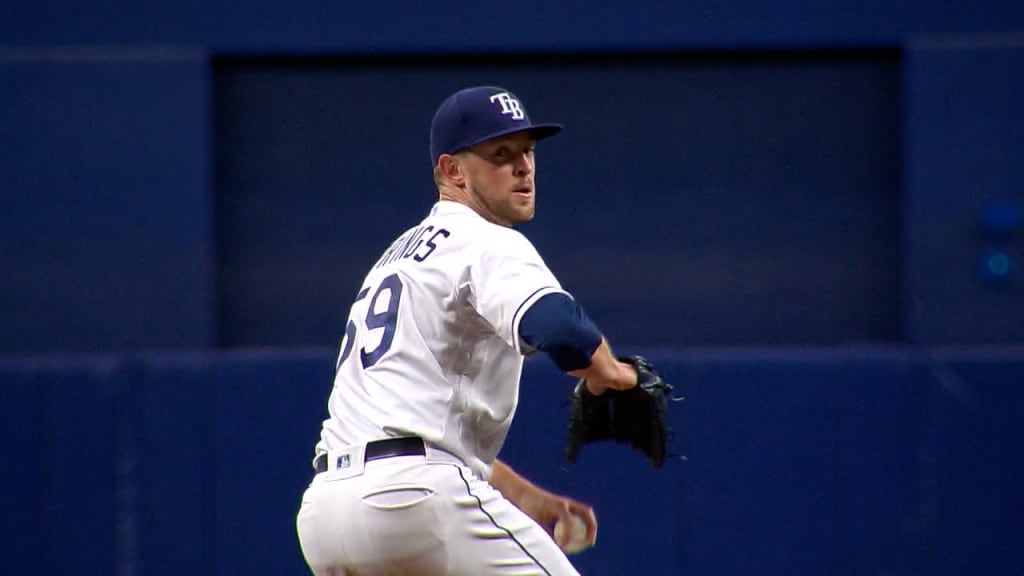Rays sign lefty Springs to 4-year extension
This browser does not support the video element.
ST. PETERSBURG -- Not long after officially signing a four-year, $31 million contract extension with the Rays that could pay him up to $65.75 million over the next five seasons, Jeffrey Springs had trouble putting the moment into perspective.
“Honestly, I don't even know if it's fully sank in quite yet. Tons of emotion,” Springs said on Wednesday. “This is just something that is kind of hard to believe.”
You could say the same thing about the 30-year-old left-hander’s path to this point.
Springs was picked in the 30th round of the 2015 Draft, the 888th overall selection, out of Appalachian State University. He signed with the Rangers for $1,000. Two years later, while pitching in High-A, he was moved to the bullpen. He made his big league debut as a reliever in July 2018, only to be traded twice in the next three years.
After harnessing his stuff and establishing himself as a quality reliever two years ago, Springs injured his right knee and needed season-ending surgery to repair a torn ACL. He recovered quickly and again became a key part of Tampa Bay’s bullpen. Then, about a month into last season, the Rays had an idea for their injury-depleted rotation.
What if they made Springs a starter again?
Springs delivered more than anyone could have expected. After officially joining the rotation on May 9, he posted a 2.65 ERA with 130 strikeouts and only 28 walks in 122 1/3 innings over 24 starts. It was just another chapter in a career that president of baseball operations Erik Neander called “a story of constant development and improvement.”
“Jeffrey's someone that, for a long time, has made the most of his opportunities and hasn't always been given the benefit of the doubt,” Neander said.
“That's something that kind of helped mold me into the person and player I am today, and I wouldn't change that for anything,” Springs said. “It's a special organization, and I'm very excited to be here.”
Springs, who had been set to reach free agency after the 2024 season, will now earn $4 million this season, $5.25 million in ’24, and $10.5 million in ’25 and ’26. His 2027 club option is for $15 million, with a $750,000 buyout. He could reach the maximum value of $65.75 million over the life of his contract through the club option being exercised as well as various incentives for innings pitched and Cy Young Award escalators.
Springs had been one of seven players poised to proceed to an arbitration hearing with the Rays. He filed earlier this month for a $3.55 million salary for 2023, MLB.com’s Mark Feinsand reported, while Tampa Bay countered at $2.7 million. But this extension was in the works for months, as Neander said he first broached the idea with Springs shortly after the Rays were eliminated from postseason contention in the American League Wild Card Series.
While Tampa Bay has committed to a pitcher with a limited track record as a starter, Springs has sacrificed at least two of his free agent years, but he called the decision “a no-doubter.”
This browser does not support the video element.
“I love the organization. I love winning. I love playing in this division and just the people that [the Rays] are outside of baseball, from the top down,” Springs said. “The longer I'm around them, the more I get to see that side of it, and it's a place that I would love to stay as long as possible.”
The Rays acquired Springs from the Red Sox along with right-hander Chris Mazza in a February 2021 trade for catching prospect Ronaldo Hernández and infielder Nick Sogard. It was a perfect fit from the start. Springs credits everyone from the front office to the coaching staff, particularly pitching coach Kyle Snyder and former bullpen coach Stan Boroski, to his fellow pitchers for helping him find his footing with the Rays.
He put it all together last year, especially after moving into the rotation.
His 2.46 ERA ranked second in franchise history among pitchers who threw at least 100 innings, behind only Blake Snell’s 1.89 ERA in his Cy Young Award-winning 2018 season. Among AL pitchers who worked 100 innings last season, only Justin Verlander, Dylan Cease, Alek Manoah, Shohei Ohtani and Nestor Cortes had a lower ERA.
“That’s a big reason why we're here at this point; we see him continuing to do that moving forward,” Neander said. “He's earned that, and we're really excited that we're going to keep him around here longer than we otherwise would have.”
